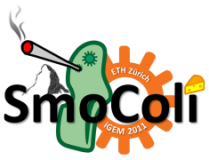Team:ETH Zurich/Process/Microfluidics
From 2011.igem.org
(Difference between revisions)
(→Evolution of channel design) |
|||
| Line 15: | Line 15: | ||
| | | | ||
== '''Evolution of channel design''' == | == '''Evolution of channel design''' == | ||
| - | We relatively early figured out that we need a some kind of channel to establish the acetaldehyde or xylene gradient needed for SmoColi (see [[Team:ETH_Zurich/Overview/CircuitDesign|Circuit Design]]). However, there were several different channel designs possible, and the final design evolved through an iterative series of design steps and design validations. The first designs were validated based on vast simulations, the final design furthermore by biological experiments in the lab (see [[ | + | We relatively early figured out that we need a some kind of channel to establish the acetaldehyde or xylene gradient needed for SmoColi (see [[Team:ETH_Zurich/Overview/CircuitDesign|Circuit Design]]). However, there were several different channel designs possible, and the final design evolved through an iterative series of design steps and design validations. The first designs were validated based on vast simulations, the final design furthermore by biological experiments in the lab (see [[Validation|Systems Validation]]). |
#'''Microfluidic channel with flow and recycling of the medium''' | #'''Microfluidic channel with flow and recycling of the medium''' | ||
Revision as of 23:56, 21 September 2011
| Microfluidics |
| ||
|
Insert text here. | |||
Evolution of channel designWe relatively early figured out that we need a some kind of channel to establish the acetaldehyde or xylene gradient needed for SmoColi (see Circuit Design). However, there were several different channel designs possible, and the final design evolved through an iterative series of design steps and design validations. The first designs were validated based on vast simulations, the final design furthermore by biological experiments in the lab (see Systems Validation).
|
 "
"


